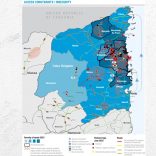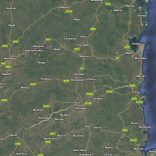Mozambique: Chiúre in panic following terrorist incursion - AIM report
Cabo Delgado insurgency: Expert reports over 200 attacks – Carta

Map presented by violent extremism expert Jasmine Opperman on her Facebook page
Last Thursday, November 21, Jasmine Opperman, the Africa Desk Director of the Terrorism Research & Analysis Consortium, a repository of digital research intelligence, covering terrorism and political violence, posted a map showing the seven districts which suffered 229 attacks by the insurgent group on her Facebook page.
According to the expert in methodological risk analysis and the management of intelligence processes (operations, counterintelligence, covert activities and analysis), the insurgents led six attacks in 2017 and 60 in 2018 – 18 in the first half of the year and 42 in the second half. In 2019, the northern area of Cabo Delgado recorded 69 attacks between January to June and 94 attacks from July to November 22.
Opperman, a South African national, was formerly a senior instructor at the Academy of Intelligence, focusing on operational analysis, anti-terrorism, low intensity conflict and intelligence management within a constitutional democracy, and worked as provincial head at the National Intelligence Agency of South Africa (NIA) for 19 years. Her research work is widely recognised worldwide.
Two years after the attacks started, the group’s leader, name and motivations are still unknown. The official death toll of civilians, military and alleged members of the group is also unknown, though estimates point to the possibility that the phenomenon has already taken the lives of over 300 people, as well as vandalising public and private property.
Data from the Cabo Delgado Provincial Government indicate that about 68,000 people have abandoned their villages in the five districts most affected by the attacks (Macomia, Mocimboa da Praia, Palma, Nangade and Muidumbe), and taken refuge in Mueda district, Pemba city, and other surrounding regions.
The figures come at a time when the group has intensified its actions, despite the Defence and Security Forces (FDS) having received reinforcement from Russian ‘Wagner’ group mercenaries.
Military sources cited by ‘Carta’ denounce the “collusion” between the FDS and the Russian mercenaries on the grounds that the techniques used by the group contradict the logic of the Mozambican side, despite their operations being dictated from Maputo and not by the men on the ground.
Last Friday in Mueda district, Cabo Delgado province, President Filipe Nyusi again expressed his desire to ascertain the insurgents’ origin and motivations.
At the meeting, President Nysui presented to the population the Minister of National Defence Atanásio M’tumuke, the Director General of the State Information and Security Service (SISE), Júlio Jane, and the Commander General of the Police of the Republic of Mozambique (PRM), Bernardino Rafael. The head of state argued that the end of the armed attacks in that northern province of the country depended on the “vigilance and cooperation of the population”.
Interior Minister Basílio Monteiro said, at the opening of the ministry’s XXIX Coordinating Council in Chidenguele, Mandlakazi district, Gaza province, last Saturday, that the FDS were committed to combating those attacking civilian and military targets in the provinces of Cabo Delgado, Manica and Sofala.
Minister Monteiro said the situation there required a redoubling of FDS efforts to ensure the safety of local residents, as requested by the President of the Republic at his meeting with the FDS in Cabo Delgado.
By Omardine Omar
About Jasmine Opperman
Jasmine Opperman is director Africa at the Terrorism Research and Analysis Consortium and an analyst at the Islamic Theology of Counter Terrorism. Her proficiency in methodological risk analysis and the management of intelligence processes — operations, counterintelligence, covert activities and analysis — comes from 19 years employment in formal intelligence structures, when she served as provincial head for South Africa’s Eastern Cape province. Since leaving the intelligence community, Jasmine has been engaged in several projects related to business risk and process analysis to help transform risks into business opportunities. Her interests are primarily related to Africa’s political and economic trends and developments and their impact on various business sectors.
She holds a master’s degree in history from the University of Johannesburg, and has published numerous articles for local media and been interviewed by all major TV networks in South Africa and Nigeria. She is also currently the only person directly engaged in de-radicalisation programs in South Africa, during which she has successfully intervened in five of seven such programs. (Source: Stratfor)













Leave a Reply
Be the First to Comment!
You must be logged in to post a comment.
You must be logged in to post a comment.